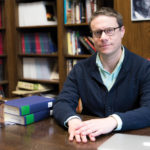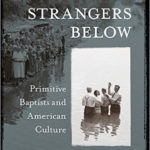Associate Professor of History Dr. Josh Guthman’s first book has been published by the University of North Carolina Press. Asiae Roberts ’18 had the chance to speak with him about the path that brought him to Berea College and his interest in the Primitive Baptist movement.

How did you come to Berea?
I found my way to Berea by a long and winding road… I first went to graduate school in the South at UNC-Chapel Hill. That was after I had grown up in Los Angeles, went to college in Chicago, and lived for a little bit in London, England. But my interests were in Southern history and Southern culture. That’s sort of how I found my way here, because there was a job opening here, and I knew about Berea and about its place in American history, and when I saw they wanted an American historian I thought, “Oh that’s me; you want me.” And, so yeah, here I am.
Since being at Berea, you’ve written a book and your book explores the history of Primitive Baptists. Can you tell me how you define Primitive Baptists?

Yes, well, Primitive Baptists. Let’s go back to the beginning; that’s how I found them. I found them in (the history of) the early 19th century. And in the early 19th century to be a Primitive Baptist was to be somebody, a Baptist, an evangelical Protestant who had big problems with a lot of the things that were going on in Evangelical churches and in Protestant churches.
Specifically, Primitive Baptists were against missionaries and missions in general. They were against formal theological training for ministers. They were against the entire apparatus that was being built up by Evangelical congregations across the country to serve other ends than simply preaching the Gospel directly to people in the pews. Primitive Baptists objected to all of this, and they also held firm to Calvinist tradition. Belief in predestination was absolutely crucial to them. They saw their world slipping away and they said “no” – things have to change. And so what happened was people who previously simply identified themselves as Baptists, separated and eventually called themselves Primitive Baptists.
Do you relate to the practice of Primitive Baptists in any way, and what motivated your interest in studying this group of people?
I heard them first. I heard them singing, and it’s the sound that captured me. It was the sound of their singing that got me interested in them. I was working in the Folk Life archives and I put on a tape of Primitive Baptists singing…. I was not at all familiar with it, and I pressed play, and I was going to do my job of data entry, to pay my rent, and I heard this music, this, singing and it just stopped me dead. I had never heard anything like it. It sounded to me at the time like people calling up spirits; it sounded luminescent and it sounded funereal, it sounded mysterious. It reminded me of some old twisting cantorial melodies that I had heard in synagogue growing up as a Jew. Mostly I just found it mesmerizing and beautiful, and I wanted to know where this singing came from. Who were these people? Why were they singing like that, and how was that singing doing its magic on me? And so the project just started from there – this curiosity but also this kinship with the sound. And then, the more I listened to the music, the more questions I had. And then the more questions I had, the more I would do some more exploring and find out who these people were. And the more I found out about who the Primitive Baptists were, the more I thought, you know, there’s a story here. There’s a story here and I want to tell it.

